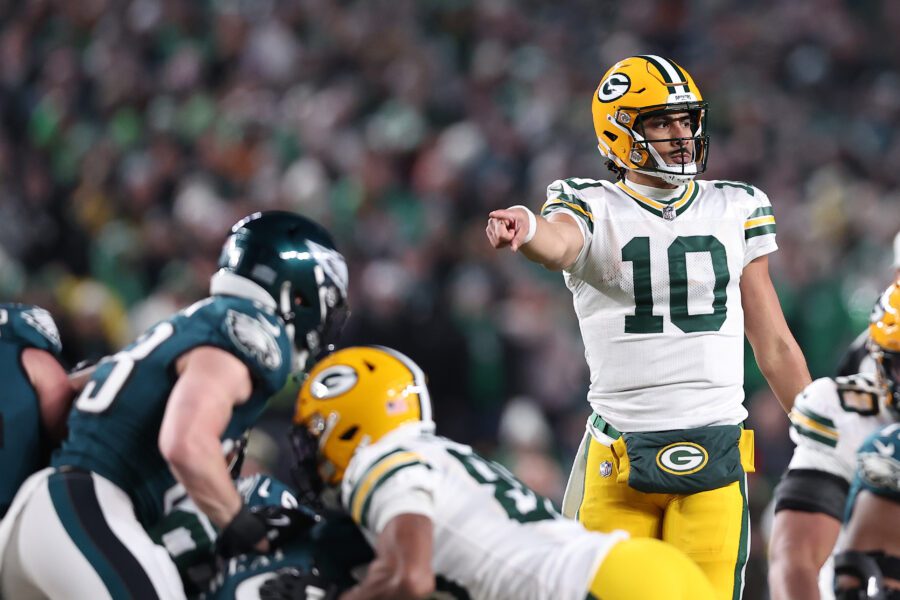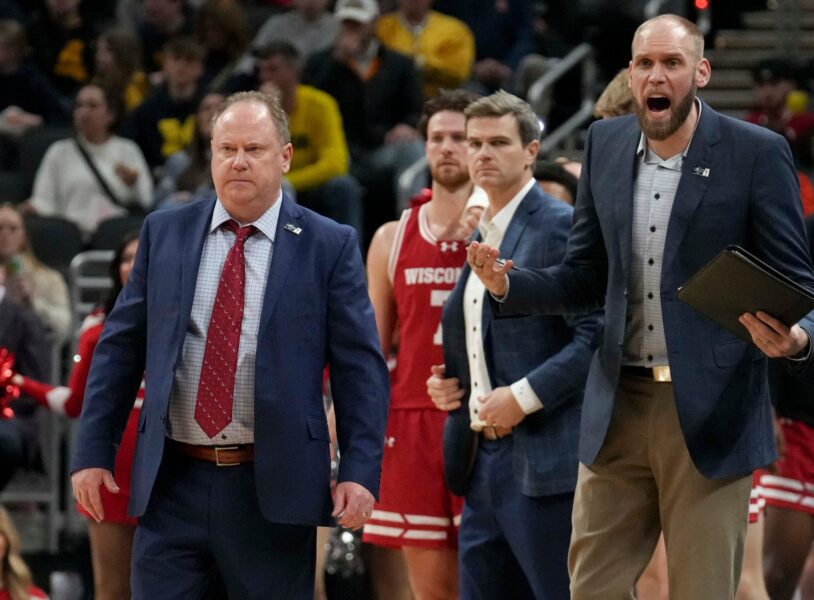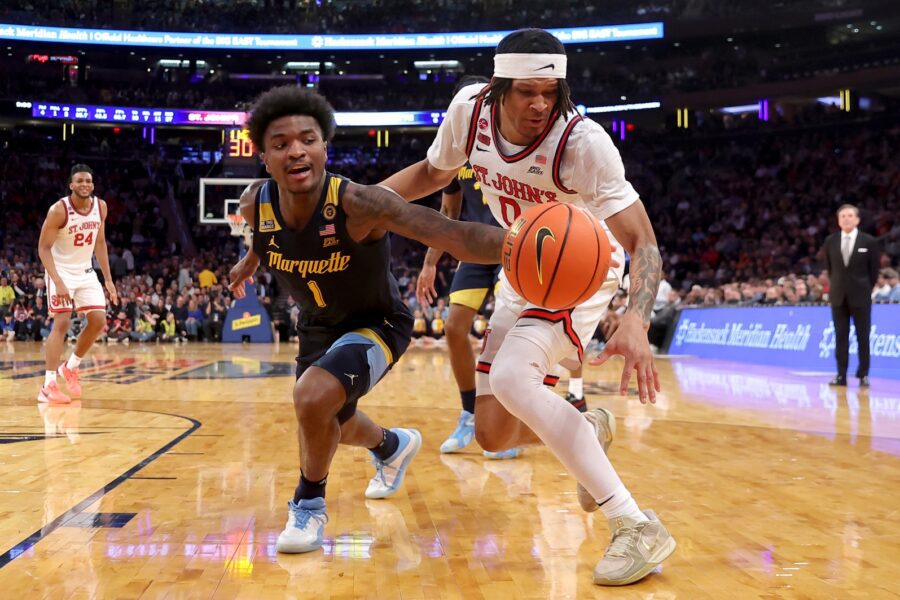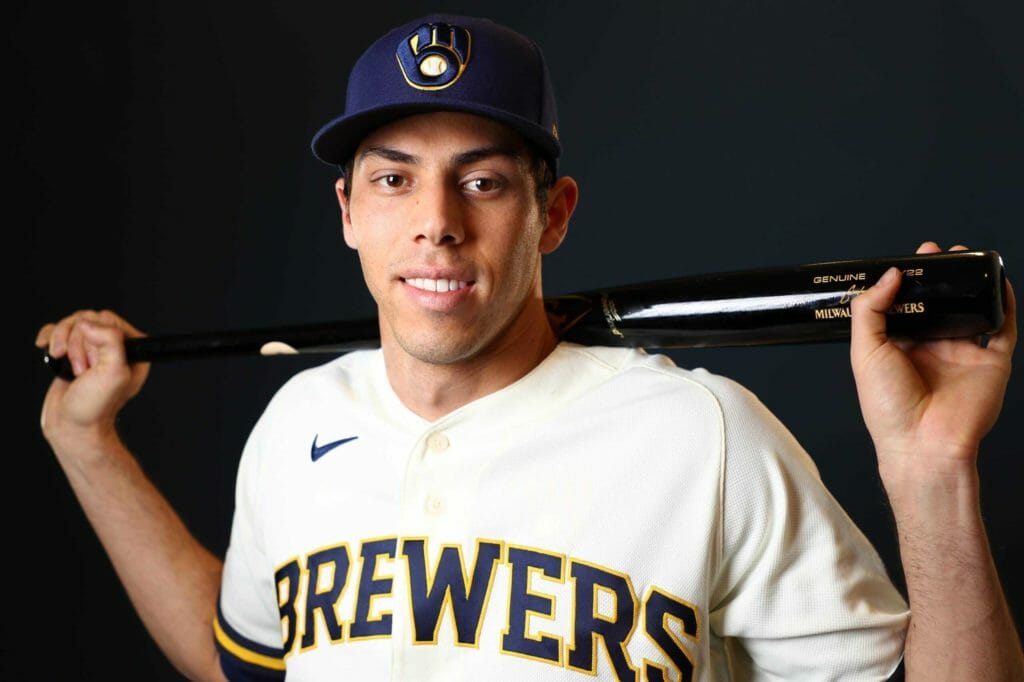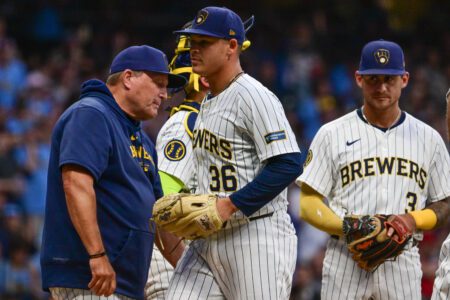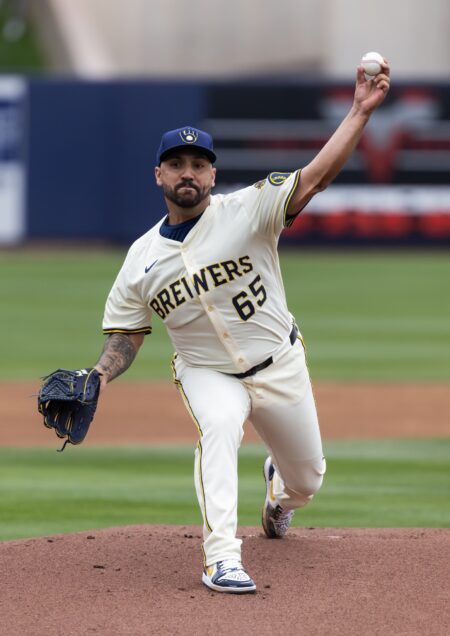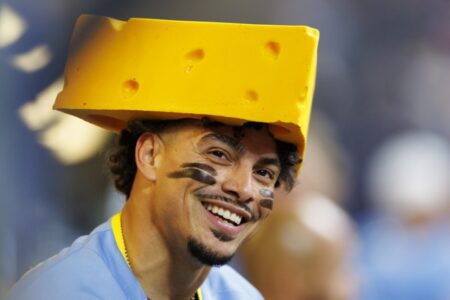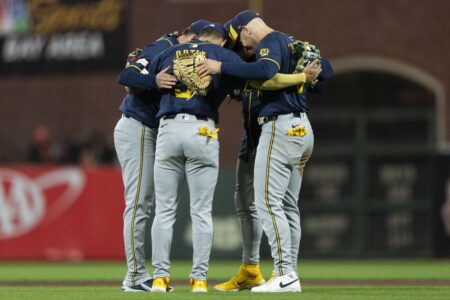It’s no secret that the 2020 Milwaukee Brewers had a tough time offensively. To be blunt, “tough” is a kind description of how things went. The Brewers were 24th in RBIs, 25th in total hits, and 26th in runs scored and batting average, according to MLB.com. You don’t finish with those kinds of numbers unless the issues are widespread, and Milwaukee compared unfavorably to the rest of the league at pretty much every position.
According to Baseball Reference, the league average player hit for a batting average of .244 last season. While cross-positional batting comparisons aren’t the perfect way to look at baseball, there can be some value from knowing that the Brewers had just five players top that average mark out of the twenty-one that took at least a single at-bat. One was Lorenzo Cain, who opted out of the season after only five games. Two others were Daniel Vogelbach and Mark Matthias, who combined for just 35 games and 103 plate appearances between the two of them.
Eleven Brewers walked up to the plate more than 100 times, and just two ended those at bats with hits at a rate higher than league average. Orlando Arcia led that group by hitting .260, good for just 73rd in the league among qualified players. There’s simply very little that this team did right with the bat in their hands last year.
Brewers’ Complementary Pieces
And yet, Milwaukee still managed to sneak into the playoffs behind a good pitching staff with a number of elite options. The pitchers–led by Josh Hader, Devin Williams, Brandon Woodruff, and Corbin Burnes–will be back, but the 2021 Brewers will live or die on the offensive performance of their position players. If anything more than a desperate playoff chase is in the cards, it will be because the bats woke up. This will be true even if the pitching staff maintains their stellar work without any drop-off. Can we expect the bounce back to come? The answer likely depends on Christian Yelich.

There’s no doubt that good baseball teams aren’t made by lone individuals. Mike Trout is and seemingly always will be the prime example of this. There are places beyond Yelich to look for positive offensive progress too, from the return of Cain to likely improvement from Avisail Garcia and Keston Hiura after disappointing seasons, never mind the fact that players will have a better chance to find their rhythm over what will hopefully be a full season with spring training. None of those things change two crucial factors:
- Yelich, given his MVP-caliber play in prior years, saw the biggest drop from 2019 to 2020, which means he has the most room to climb this upcoming season
- Yelich is a top-of-the-league offensive force capable, at the height of his powers, of turning a wild card team into a serious title threat
In other words, while the offense will not rise or fall solely based on the play Yelich provides, he is the one player to focus on more than any other.
Yelich’s Fall in Form

It’s not quite as simple as saying Yelich was nowhere close to his past self across the board. What is true, very simply, is that he just stopped hitting the ball:
| 2018 | 2019 | 2020 | |
| BA | .326 | .329 | .205 |
| OBP | .402 | .429 | .356 |
| Slugging % | .598 | .671 | .430 |
| Hits/100 AB | 32.6 | 32.9 | 20.5 |
| RBI/100 AB | 19.2 | 19.8 | 11 |
| Ks/100 PA | 20.7 | 20.3 | 30.8 |
Yelich went from two-time batting champ to barely managing a hit in one-fifth of his at bats, and his struggles there directly influenced drop-offs in other categories:
- Despite a significant increase in walks, which I will get to later, Yelich saw a big decrease in on-base percentage (OBP) because he simply wasn’t getting base hits. He actually finished the season with five more walks than hits, a rare occurrence for anyone that doesn’t fit into the power-only category. The fact that he ended up there is rather telling.
- RBIs also fell after steady production in ‘18 and ‘19. Now, the overall offensive struggles deserve some of the blame here. You can’t drive in many runs if no one is on base. That doesn’t fully absolve Yelich though. His inability to get on base with his bat also contributed to the decrease in RBIs.
- Strikeouts went up, which is as bad as these other stats going down. You didn’t need to watch many games last year to see Yelich looking clueless at the plate. Anyone experiencing such an extreme drop-off in batting average is either the unluckiest person in world history or the victim of an increasing number of strikeouts.
- Slugging percentage is the one that really requires a deeper look. It’s a simple calculation of total bases divided by at bats. Thus, it puts more emphasis on doubles, triples, and home runs than the simple batting average.
Extra Base Hits vs. Singles
So here’s an important question: was Yelich significantly less successful at creating extra base hits last season, or were the singles that form the majority of any player’s hits the primary issue?
| 2018 | 2019 | 2020 | |
| 1B per 100 AB | 19.2 | 17.4 | 10.5 |
| 2B per 100 AB | 5.9 | 5.9 | 3.5 |
| HR per 100 AB | 6.3 | 9.0 | 6.0 |
For singles and doubles, we see a decrease that is both clear and large. The issue was not exclusive to any one type of hit. What’s interesting is that Yelich was hitting home runs at a similar rate to his 2018 season. They weren’t clustered into a few tiny periods either; he only experienced four stretches of four or more consecutive homerless games last season, a number that has no significance whatsoever when compared to previous years. He was even tied for 31st in the league in home runs despite ranking 66th in at bats. The man did not lose all of his power.
I would consider this a very good sign that the player we saw for two seasons can come back next year. The big power jump that he made after coming over from Miami was at the center of his two MVP-caliber seasons, so it’s good to see some signal of that in last year’s numbers.
With that said, last year’s version of Yelich has a long way to climb to return to elite offensive form. How far can he go? From my view, there are two valid answers to consider. Let’s start with the less positive one, which I also believe to be the less likely of the two:
Possibility One: ‘18 and ‘19 Were Isolated Career Years

Yelich was very good in Miami, hitting above .280 and posting positive WAR in all five seasons. He also won a Gold Glove, a Silver Slugger, topped 80 RBIs twice, and stole at least 15 bases three times during his tenure. There wasn’t a Steve Rogers to Captain America type transformation when he was traded to the Brewers; Yelich was already one heck of a player.
In ‘18 and ‘19, Yelich hit 80 home runs, posted 10.7 combined WAR, and led the National League in offensive WAR, batting average, slugging percentage, OPS, and OPS+. He led the NL in total bases in 2018 and OBP in 2019. Compare that to his five years with the Marlins, where he hit 59 total home runs and produced 8.9 total WAR.
Two conclusions can be taken from this:
One, it would have been surprising if Yelich didn’t get better in Milwaukee given the upward trajectory in his power and overall production as he got older in Miami. He hit 39 homers in his last two seasons with the Marlins after hitting just 20 the first three. He was also 25 when the trade was made, meaning he’s spending his athletic prime with the Brewers. No one should expect Yelich to suddenly revert to his Miami years.
Two, the absurd levels to which he rose in 2018 and 2019 might not be reachable again. Yelich was arguably a top five position player both years. That quality is difficult to maintain. Guys like Tom Brady, LeBron James, and Aaron Rodgers have spoiled us into forgetting that not every superstar stays that way for ten years. It’s entirely possible Yelich will be a good (but not elite) player moving forward and that last year, though extreme, may ultimately be an accurate warning of impending decline.
Possibility Two: 2020 Just Got to Yelich
I’ll start with the simple and obvious. We’re looking at a player who went into the last off-season at the tail end of the recovery process for his fractured knee cap. That injury meant that he missed more than a month of games at the end of the 2019 season, and then he went through a disrupted spring training before a delayed and shortened 2020 season. In a profession where rhythm and feel are everything, Yelich didn’t have a whole lot to go off of in either regard. The inconsistencies of last season didn’t just hit him either. Here’s a list of notable players that finished 2020 with a batting average below .250:
- Cody Bellinger (.239)
- Josh Bell (.226)
- Joey Votto (.226)
- Nicholas Castellanos (.225)
- Anthony Rizzo (.222)
- *Jose Altuve (.219)
- JD Martinez (.213)
- Keston Hiura (.212)
- Yelich (.205)
- Javier Baez (.203)
- Eugenio Suarez (.202)
- Kyle Schwarber (.188)
There are some catastrophic numbers here, and while Yelich stands out given just how good he was before last season, he clearly was not alone in his struggles. Unless you believe all these guys are set for another down year, there’s not much reason to doubt Yelich’s ability to bounce back for a much better 2021.
The Base-on-Balls Factor
| 2018 | 2019 | 2020 | |
| Walks per 100 PA | 10.4 | 13.8 | 18.6 |
Yelich was third in all of baseball with 46 walks on the season, and the size of the increase above should indicate that he became smarter and more selective at the plate. While being more selective doesn’t mean as much if you can’t make anything of the opportunities you do get, it will be a strong complementary piece if he can maintain it moving forward.
The other thing to consider here is that Yelich likely walked more partially because opposing pitchers were just more cautious with him. If that was a major factor last year, it’s possible that he was struggling to adjust to that approach on top of the difficulties of the delayed and shortened season. He took the league by storm, and now he’s going to have to counteract the adjustments that everyone has made to him. That was especially hard to do on-the-fly last year.
We know that Christian Yelich struggled to hit the ball last year. The numbers showed it, and it was clear to anyone that watched the games. The key question is not whether that will change. There were enough really good players in a funk last season for us to work under the assumption that we will see a much-improved version of Yelich in a full 2021 season. The key question is instead whether or not he can take that improvement all the way back to MVP levels. Given the home runs he hit last year, the great walk numbers, and the overall history of great contact hitting that he carries behind him, I think there’s good reason to hope for the best. I’m certainly not betting against him.
Why Yelich Holds the Keys

The Brewers are going to need MVP Yelich back. The bottom line is the offense needs to be better as a whole. A full season of Cain will help, as will improvements from Hiura and García. It’s hard to see the rest of the position players being worse than they last year, even if no one takes a significant jump (Omar Narváez is a guy to watch). But none of those guys is the difference maker Yelich is.
ESPN has WAR tracked back to 2000. Since, 15 of the last 21 World Series champions (13 of the last 15) have had at least one player that finished in the top 15 in offensive WAR:
- 2020 Dodgers: Betts (8th), Seager (12th)
- 2019 Nationals: Rendon (8th)
- 2018 Red Sox: Betts (2nd), Martinez (6th), Bogaerts (9th)
- 2017 Astros: Altuve (1st), Correa (8th), Springer (10th)
- 2016 Cubs: Bryant (4th)
- 2015 Royals: Cain (13th)
- 2014 Giants: Posey (10th)
- 2013 Red Sox: None (Pedroia, Ortiz, Ellsbury closest)
- 2012 Giants: Posey (4th)
- 2011 Cardinals: Berkman (14th)
- 2010 Giants: None (Huff, 27)
- 2009 Yankees: Jeter (6th), Teixeira (15th)
- 2008 Phillies: Utley (10th)
- 2007 Red Sox: Ortiz (6th)
- 2006 Cardinals: Pujols (3rd)
- 2005 White Sox: None (Konerko, 42nd)
- 2004 Red Sox: None (Ramirez, Ortiz, Varitek closest)
- 2003 Marlins: None (Rodriguez, 47th)
- 2002 Angels: None (Eckstein, 42nd, and Salmon, 49th)
- 2001 Diamondbacks: Luis Gonzalez (7th)
- 2000 Yankees: Jeter (8th)
Who do the Brewers have that can fit that role? Cain is no longer of this caliber offensively. Hiura has the potential but likely needs more time at the MLB level. No one else is good enough except for Yelich. He is the engine that makes this team fly, and the Brewers will only have a real shot at their first World Series if he returns to MVP form.
Follow For More!
Looking for more great content on the Milwaukee Brewers? Follow me on Twitter at @MikeRegan09 and follow us at @WiscoHeroics1! To read more of our articles and keep up to date on the latest on all things Wisconsin sports, click here.

